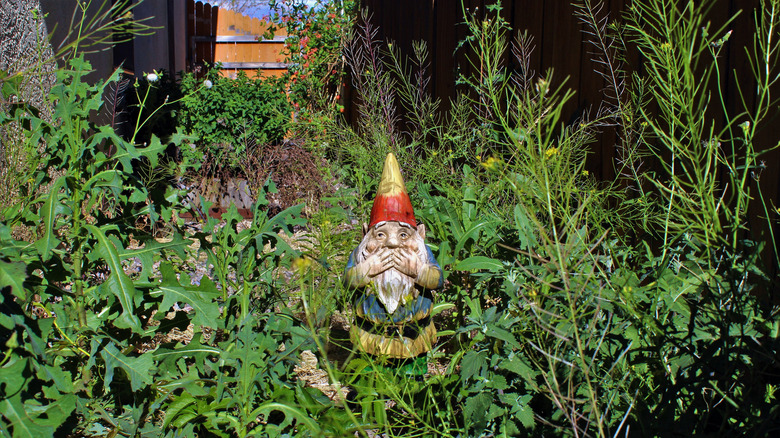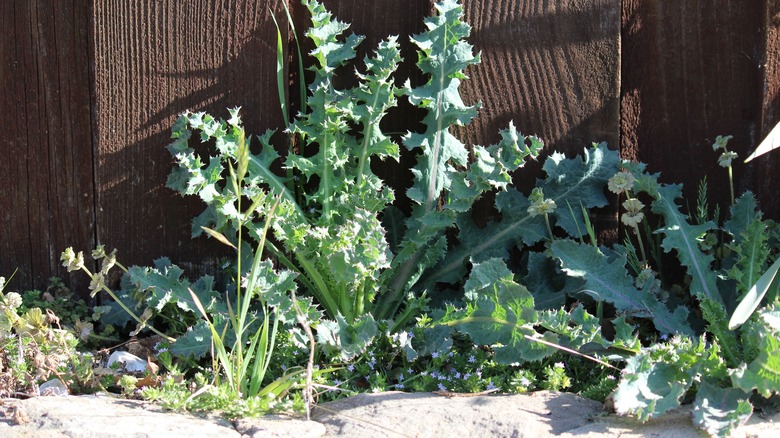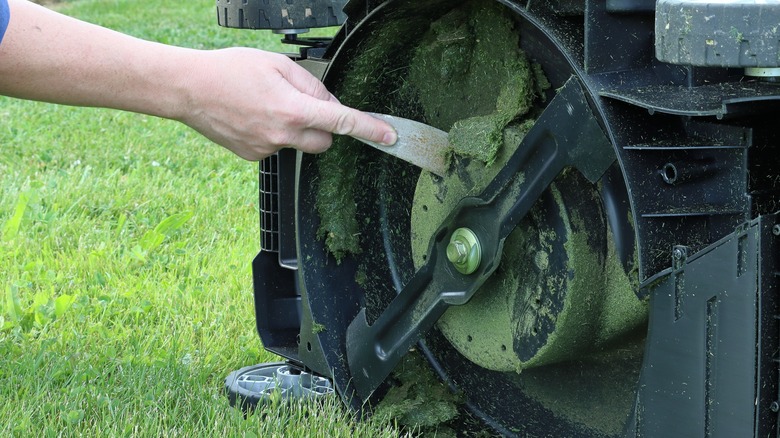The WD-40 Hack That May Kill Prickly Weeds In Your Yard
Weeds in your yard or garden are aggravating enough, but when they're the prickly kind, they're even worse. With a typical weed, you might reach down and pluck it out by its roots when you're walking by, but the weeds that arm themselves with barbs and pinchers don't make that scenario a very comfortable option. Nonetheless, the spiny weeds must go, and WD-40, a chemical found in many households, may offer a hack to help with your prickly problem.
First of all, you might find yourself wondering just what WD-40 is. When it comes to your home environment, especially if you might be putting the substance around your garden and thus near anything you could consume, it's wise to be fully aware of what's in the container. In the case of WD-40, extreme care is warranted; the product is derived from petroleum and is designed to be a lubricant that, while it has many great uses (the company maintains a list of over 2,000), officially speaking, weed assassination is not one of them.
But if you're desperate or you've been working on your lawn mower and the can of WD-40 is handy, you might want to give this hack a try to kill the prickly weeds that are plaguing you and propagating throughout your pristine acreage.
Prickly weeds are particularly pesky to kill
In your quest to rid your yard or garden of weeds, you may need, at times, to use some extra firepower (but not literally, please!). Many prickly weeds, like Canada thistle (Cirsium arvense), which possesses a strong deep tap root that also grows horizontally, are notoriously challenging to eradicate.
At the same time, you might have been trying to avoid store-bought weed killers, whether because you wanted to be organic or because of the abundance of chemicals they list, or because they're costly. Or perhaps you've tried Epsom salts mixed with vinegar and dish soap, a DIY method that works, especially on sunny days, but needs to be applied carefully because it will kill whatever vegetation it touches.
Another option is WD-40, a hack that works much the same way as the Epsom salts-vinegar-dish soap solution. As a water displacement compound, one way that WD-40 kills prickly weeds and other plants is by preventing water from entering them, which will eventually kill them. So as with the Epsom salts-vinegar-dish soap weed-killer route, you need to be careful of what else is growing in your yard or garden when applying WD-40.
If you want to be sure to keep the WD-40 on the offensive weed and not on your grass or other plants, create a collar or barrier of some sort that can surround the weed, like in this video. A piece of cardboard cut to a size that extends slightly beyond the circumference of the weed will provide protection for adjacent shrubs or grasses. Spray the plant on a day that isn't very windy for best results.
Better ways to use WD-40 in your yard and garden
As an all-purpose lubricant, rust preventative, and moisture repellent, the original WD-40 formula has many uses for your yard and garden that go far beyond the hack of killing prickly weeds by saturating them with the substance. Its well-known properties have been tried and true since it came on the market in 1958 after first having been developed for use by the United States aerospace industry.
Metal garden tools of all kinds can benefit from the anti-corrosive and rust-prevention properties of WD-40. In addition to cleaning tools, such as hoes, rakes, or lawn mower blades with the substance, a little of it can be added to a bucket of sand in which you can store your garden trowels, spades, weeders, and other hand tools.
A quick spray of WD-40 keeps the things that are supposed to move around your yard or garden moving smoothly and quietly, whether it's a porch swing, a gate, or the wheels on your grill. That same lubricating quality is equally helpful in getting things moving when you need to remove them, such as old screws and bolts when making repairs.
And it's good to remember that the "WD" stands for "water displacement." Whether it's water displacement or some other reason, the company claims that the No. 1 most unusual use for its product is spraying lawn mower blades, which keeps the blades sharper and prevents grass from sticking to them.


